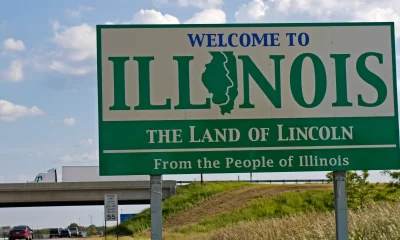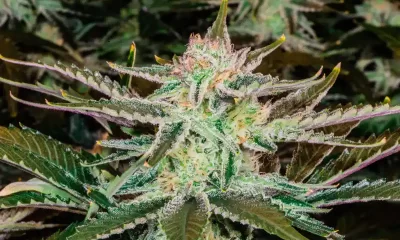Business
Recreational Pot Presents Opportunities for Missouri’s Medical Cannabis Biz

In less than two weeks, voters in Missouri will decide on an amendment to legalize recreational pot in the state, a prospect that has some established medical cannabis businesses eyeing expansion.
The St. Louis Business Journal has a report out this week on the ballot proposal, known as Amendment 3, which is “projected to create a significantly larger market for the companies that have already emerged as major players in the state’s legal medical marijuana market.”
The outlet highlighted “Proper Cannabis, a St. Louis-based medical dispensary that opened a $20 million facility in Rock Hill last year, operates three dispensaries in the St. Louis region,” which has recently expanded “its existing facility by 25,000 to 30,000 square feet in preparation for a drastic increase in demand.”
“It’s both exciting and needed,” Proper Cannabis CEO John Pennington told the Business Journal. “What you have in Missouri is two to three times the number of people who are likely already consuming, who will now have safe, compliant and enjoyable places to shop with reliable quality products and medicine.”
Medical cannabis opened for business in Missouri in the fall of 2020 after voters there passed a measure legalizing the treatment in 2018.
A year after the medical marijuana program launched, the state reported that the industry had grown to more than 140 dispensaries employing about 5,000 people.
The St. Louis Business Journal also reported on “BeLeaf Medical, an Earth City-based medical cannabis firm, made a notable change as it prepares for the possibility of a market expansion into recreational cannabis.”
According to the outlet, the company recently hired Jason Nelson as its new CEO. Nelson “joined the company three and a half months ago from Chicago-based Cresco Labs, where he was the cannabis firm’s senior vice president of horticulture,” and where he “helped the company expand into 10 states, including five that made the transition from medical to recreational sales.”
Amendment 3 officially qualified for the Missouri ballot in August, when Secretary of State Jay Ashcroft said that the group behind the proposal, Legal Missouri 2022, had submitted a sufficient number of valid signatures.
“Our statewide coalition of activists, business owners, medical marijuana patients and criminal justice reform advocates has worked tirelessly to reach this point, and deserves all the credit,” Legal Missouri campaign manager John Payne said in a statement at the time. “Our campaign volunteers collected 100,000 signatures, on top of paid signature collection. That outpouring of grassroots support among Missourians who want to legalize, tax and regulate cannabis made all the difference. We look forward to engaging with voters across the state in the coming weeks and months. Missourians are more than ready to end the senseless and costly prohibition of marijuana.”
If it is approved by voters, Amendment 3 will allow “Missourians 21 years and older to possess, purchase, consume and cultivate marijuana,” and “Missourians with nonviolent marijuana-related offenses to automatically expunge their criminal records.”
The initiative would also create a legal marijuana market that would impose a six percent sales tax on weed.
“Beyond covering administrative expenses and the costs to process automatic expungements, any remaining surplus will be split equally between veterans’ healthcare, drug addiction treatment, and Missouri’s underfunded public defender system,” Legal Missouri explains on its website.
In addition, it would allow local governments in Missouri to levy their own sales taxes of up to three percent. According to the group, state officials “project additional annual revenue of at least $40.8 million and additional local government revenues of at least $13.8 million.”
The amendment’s prospects are difficult to gauge, with polling on the proposal all over the map.
Business
New Mexico cannabis operator fined, loses license for alleged BioTrack fraud

New Mexico regulators fined a cannabis operator nearly $300,000 and revoked its license after the company allegedly created fake reports in the state’s traceability software.
The New Mexico Cannabis Control Division (CCD) accused marijuana manufacturer and retailer Golden Roots of 11 violations, according to Albuquerque Business First.
Golden Roots operates the The Cannabis Revolution Dispensary.
The majority of the violations are related to the Albuquerque company’s improper use of BioTrack, which has been New Mexico’s track-and-trace vendor since 2015.
The CCD alleges Golden Roots reported marijuana production only two months after it had received its vertically integrated license, according to Albuquerque Business First.
Because cannabis takes longer than two months to be cultivated, the CCD was suspicious of the report.
After inspecting the company’s premises, the CCD alleged Golden Roots reported cultivation, transportation and sales in BioTrack but wasn’t able to provide officers who inspected the site evidence that the operator was cultivating cannabis.
In April, the CCD revoked Golden Roots’ license and issued a $10,000 fine, according to the news outlet.
The company requested a hearing, which the regulator scheduled for Sept. 1.
At the hearing, the CCD testified that the company’s dried-cannabis weights in BioTrack were suspicious because they didn’t seem to accurately reflect how much weight marijuana loses as it dries.
Company employees also poorly accounted for why they were making adjustments in the system of up to 24 pounds of cannabis, making comments such as “bad” or “mistake” in the software, Albuquerque Business First reported.
Golden Roots was fined $298,972.05 – the amount regulators allege the company made selling products that weren’t properly accounted for in BioTrack.
The CCD has been cracking down on cannabis operators accused of selling products procured from out-of-state or not grown legally:
- Regulators alleged in August that Albuquerque dispensary Sawmill Sweet Leaf sold out-of-state products and didn’t have a license for extraction.
- Paradise Exotics Distro lost its license in July after regulators alleged the company sold products made in California.
Golden Roots was the first alleged rulebreaker in New Mexico to be asked to pay a large fine.
Source: https://mjbizdaily.com/new-mexico-cannabis-operator-fined-loses-license-for-alleged-biotrack-fraud/
Business
Marijuana companies suing US attorney general in federal prohibition challenge

Four marijuana companies, including a multistate operator, have filed a lawsuit against U.S. Attorney General Merrick Garland in which they allege the federal MJ prohibition under the Controlled Substances Act is no longer constitutional.
According to the complaint, filed Thursday in U.S. District Court in Massachusetts, retailer Canna Provisions, Treevit delivery service CEO Gyasi Sellers, cultivator Wiseacre Farm and MSO Verano Holdings Corp. are all harmed by “the federal government’s unconstitutional ban on cultivating, manufacturing, distributing, or possessing intrastate marijuana.”
Verano is headquartered in Chicago but has operations in Massachusetts; the other three operators are based in Massachusetts.
The lawsuit seeks a ruling that the “Controlled Substances Act is unconstitutional as applied to the intrastate cultivation, manufacture, possession, and distribution of marijuana pursuant to state law.”
The companies want the case to go before the U.S. Supreme Court.
They hired prominent law firm Boies Schiller Flexner to represent them.
The New York-based firm’s principal is David Boies, whose former clients include Microsoft, former presidential candidate Al Gore and Elizabeth Holmes’ disgraced startup Theranos.
Similar challenges to the federal Controlled Substances Act (CSA) have failed.
One such challenge led to a landmark Supreme Court decision in 2005.
In Gonzalez vs. Raich, the highest court in the United States ruled in a 6-3 decision that the commerce clause of the U.S. Constitution gave Congress the power to outlaw marijuana federally, even though state laws allow the cultivation and sale of cannabis.
In the 18 years since that ruling, 23 states and the District of Columbia have legalized adult-use marijuana and the federal government has allowed a multibillion-dollar cannabis industry to thrive.
Since both Congress and the U.S. Department of Justice, currently headed by Garland, have declined to intervene in state-licensed marijuana markets, the key facts that led to the Supreme Court’s 2005 ruling “no longer apply,” Boies said in a statement Thursday.
“The Supreme Court has since made clear that the federal government lacks the authority to regulate purely intrastate commerce,” Boies said.
“Moreover, the facts on which those precedents are based are no longer true.”
Verano President Darren Weiss said in a statement the company is “prepared to bring this case all the way to the Supreme Court in order to align federal law with how Congress has acted for years.”
While the Biden administration’s push to reschedule marijuana would help solve marijuana operators’ federal tax woes, neither rescheduling nor modest Congressional reforms such as the SAFER Banking Act “solve the fundamental issue,” Weiss added.
“The application of the CSA to lawful state-run cannabis business is an unconstitutional overreach on state sovereignty that has led to decades of harm, failed businesses, lost jobs, and unsafe working conditions.”
Business
Alabama to make another attempt Dec. 1 to award medical cannabis licenses

Alabama regulators are targeting Dec. 1 to award the first batch of medical cannabis business licenses after the agency’s first two attempts were scrapped because of scoring errors and litigation.
The first licenses will be awarded to individual cultivators, delivery providers, processors, dispensaries and state testing labs, according to the Alabama Medical Cannabis Commission (AMCC).
Then, on Dec. 12, the AMCC will award licenses for vertically integrated operations, a designation set primarily for multistate operators.
Licenses are expected to be handed out 28 days after they have been awarded, so MMJ production could begin in early January, according to the Alabama Daily News.
That means MMJ products could be available for patients around early March, an AMCC spokesperson told the media outlet.
Regulators initially awarded 21 business licenses in June, only to void them after applicants alleged inconsistencies with how the applications were scored.
Then, in August, the state awarded 24 different licenses – 19 went to June recipients – only to reverse themselves again and scratch those licenses after spurned applicants filed lawsuits.
A state judge dismissed a lawsuit filed by Chicago-based MSO Verano Holdings Corp., but another lawsuit is pending.
Source: https://mjbizdaily.com/alabama-plans-to-award-medical-cannabis-licenses-dec-1/
-

 Business2 years ago
Business2 years agoPot Odor Does Not Justify Probable Cause for Vehicle Searches, Minnesota Court Affirms
-

 Business2 years ago
Business2 years agoNew Mexico cannabis operator fined, loses license for alleged BioTrack fraud
-

 Business2 years ago
Business2 years agoAlabama to make another attempt Dec. 1 to award medical cannabis licenses
-

 Business2 years ago
Business2 years agoWashington State Pays Out $9.4 Million in Refunds Relating to Drug Convictions
-

 Business2 years ago
Business2 years agoMarijuana companies suing US attorney general in federal prohibition challenge
-

 Business2 years ago
Business2 years agoLegal Marijuana Handed A Nothing Burger From NY State
-

 Business2 years ago
Business2 years agoCan Cannabis Help Seasonal Depression
-

 Blogs2 years ago
Blogs2 years agoCannabis Art Is Flourishing On Etsy













